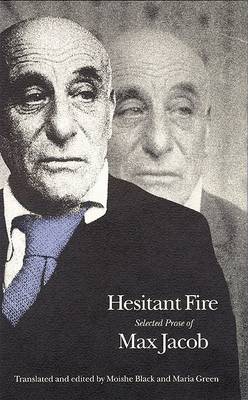French Modernist Library
1 total work
A serious artist and a literary clown nonpareil, Max Jacob was born in Brittany in 1876 and died in a Nazi prison camp in 1944. His influence on modern French poetry was profound, and his modernist lyrical verse is still widely read. Much of his other work is equally exciting and original, but has waited decades for capable translators. Hesitant Fire makes available for the first time in English some of his best prose. The translators, Moishe Black and Maria Green, have succeeded in catching his gift for linguistic innovation, for mimicry and buffoonery often a millimeter away from melancholy. This anthology displays Jacob's versatility, for he wrote in a dozen styles. "The Story of King Kabul the First and Gawain the Kitchen-Boy" is a fable populated by Balibridgians and Bouloulabassians. Excerpts from "In Defense of Tartufe" reveal the poet's mysticism and aestheticism. Those from "The Flowering Plant" offer brilliant social analysis behind a mask of the Absurd. Flim-Flam studies such characters as "The Lawyer Who Meant to Have Two Wives Instead of One" and "The Unmarried Teacher at the High School in Cherbourg." The "Dullard Prince" blends autobiography and fiction.
"Letters to Mrs. Goldencalf" and other imaginary members of the bourgeoisie are taken from The Dark Room. Never before published, "The Maid" was inspired by a contemporary murder case. Also included here are portions of "The Bouchaballe Property", Jacob's favorite of his own novels; entries from "A Traveler's Notebook"; personal letters; and four religious meditations. For many English-language readers, "Hesitant Fire" will be in introduction to a writer who was an immediate precursor of Surrealism, who was a close friend of Picasso and Apollinaire, who converted to Catholicism but retained an intensely Jewish outlook, and who produced work that is still vivid nearly a half-century after his death. Moishe Black is a professor and Maria Green a professor emeritus of French at the University of Saskatchewan. Black's articles and papers include some published by the Centre de Recherches Max Jacob. Green has compiled a "Bibliographie et documentation sur Max Jacob" (1988) and a "Bibliographie integrale de la poesie de Max Jacob" (1991) and has edited three volumes of Jacob's letters.
"Letters to Mrs. Goldencalf" and other imaginary members of the bourgeoisie are taken from The Dark Room. Never before published, "The Maid" was inspired by a contemporary murder case. Also included here are portions of "The Bouchaballe Property", Jacob's favorite of his own novels; entries from "A Traveler's Notebook"; personal letters; and four religious meditations. For many English-language readers, "Hesitant Fire" will be in introduction to a writer who was an immediate precursor of Surrealism, who was a close friend of Picasso and Apollinaire, who converted to Catholicism but retained an intensely Jewish outlook, and who produced work that is still vivid nearly a half-century after his death. Moishe Black is a professor and Maria Green a professor emeritus of French at the University of Saskatchewan. Black's articles and papers include some published by the Centre de Recherches Max Jacob. Green has compiled a "Bibliographie et documentation sur Max Jacob" (1988) and a "Bibliographie integrale de la poesie de Max Jacob" (1991) and has edited three volumes of Jacob's letters.
